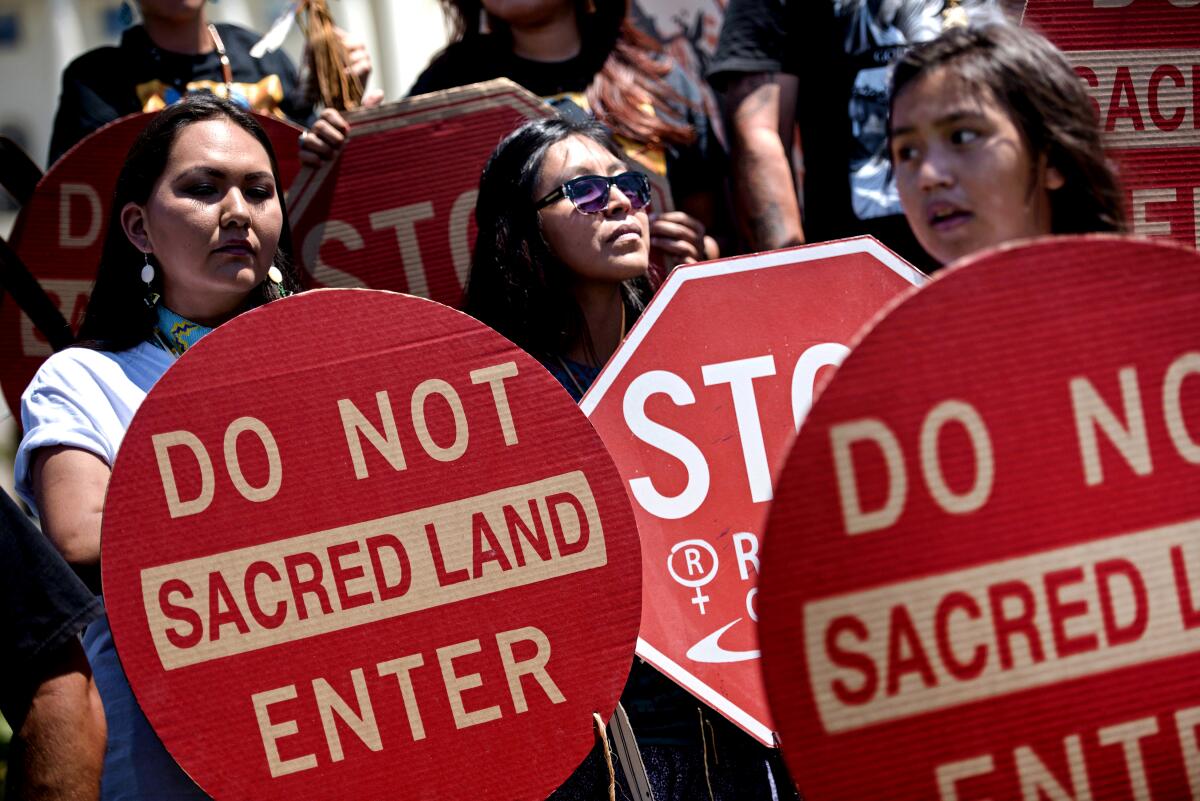Op-Ed: Will the Biden administration stop the cultural and environmental atrocity at Oak Flat?

- Share via
An hour’s drive east of Phoenix, the Sonoran Desert landscape collides with a spectacular bedrock escarpment jutting up to an elevation of 4,700 feet called Apache Leap. This place is where my ancestor warriors engaged in a pitched battle during the height of a concerted campaign in the 1870s to exterminate American Indians from our ancestral lands.
U.S. Highway 60 then dives into the mountain, snaking through canyons and tunneling deep into the heart of traditional Apache land. The highway soon skirts my tribe’s most sacred religious and cultural site, Chí’chil Biłdagoteel, also known as Oak Flat. The importance of Chí’chil Biłdagoteel to our people cannot be overstated.
This site of riparian splendor graced by Emory oak trees is our Sistine Chapel. This land is where we connect directly to the Creator, where our daughters pass into womanhood through the Sunrise Ceremony, where our past reaches into our future.
Chí’chil Biłdagoteel has served as a culturally significant and sacred site to many tribal nations in the region for the last 1,500 years. The site was designated by the National Park Service as a Traditional Cultural Property in 2016 and included on the National Register of Historic Places.
Chí’chil Biłdagoteel has been shielded from most development since it was included as part of Tonto National Forest when it was formed in 1905. President Dwight Eisenhower further enhanced the site’s protection in 1955 when he signed a public land order placing it off-limits for potential mining.
But those protections vanished under cover of darkness in 2014. Without debate, two former Arizona Republican senators, Jeff Flake and the late John McCain, included an unrelated, last-minute provision in a must-pass defense spending bill that requires the Tonto National Forest to transfer the public land at Oak Flat in a land swap to two of the largest, foreign-based, multinational mining companies in the world.
Rio Tinto and BHP, through a joint venture known as Resolution Copper Co., intend to extract 40 billion pounds of copper that lies more than a mile beneath Chí’chil Biłdagoteel. The mining technique would cause Chí’chil Biłdagoteel to collapse into a 1,000-foot-deep, 2-mile-across crater, destroying our most sacred land.
My tribe is determined to prevent this atrocity. We have filed a federal lawsuit to block the land trade. Two other lawsuits to stop this project are also working their way through the courts.
We are lobbying the Biden administration to prepare an environmental impact statement that fully and adequately addresses our religious concerns. And we are strongly supporting the Save Oak Flat Act introduced in March by Rep. Raul M. Grijalva (D-Ariz.) that would repeal the mandated transfer of Chí’chil Biłdagoteel to Resolution Copper. The bill was approved by the House Committee on Natural Resources. Sen. Bernie Sanders (I-Vt.) has sponsored similar legislation in the Senate.
Protecting Chí’chil Biłdagoteel would respect the heritage of Native American tribes. It would also be in the best interest of all Arizonans. The Resolution mine would consume a massive amount of Arizona’s rapidly declining ground and surface water at a time of an extended drought.
For the first time, Arizona is facing major cutbacks from its allocation of Colorado River water. And the state is falling far short of a 40-year goal to equalize the amount of groundwater pumped with the amount recharged into aquifers, according to a newly released study by Arizona State University.
“Our analysis shows that Arizona continues on a path of unsustainable groundwater use that threatens the health and welfare of our state,” Kathleen Ferris, former director of the Arizona Department of Water Resources, states in the report.
The Resolution mine would consume 775,000 acre-feet of water — enough to supply a city of 140,000 people for 50 years. Resolution’s groundwater mining is estimated to reduce the value of nearby Arizona state trust lands by at least $537 million. Proceeds from the land trust help finance Arizona’s public schools. The mine would also create an 8,600-acre liquefied waste dump impounded by a tailings dam.
The mine would also destroy an emerging tourist-based economy in the small towns in the area, including Superior, which hosts rock climbers from across the world to climb the boulders and spires at Oak Flat.
Resolution claims it will hire several thousand workers, but these numbers are inflated given that the mine will be 7,000 feet underground and operated by robots. Thomas Power, a University of Montana economist, predicts that the mine will employ only 349 people. So far, Resolution has not hired union workers for its more than $1 billion worth of preliminary construction.
Protecting Chí’chil Biłdagoteel acknowledges the rights of Indigenous people in America and sends a powerful signal to the rest of the world. It would protect Arizona’s water supplies for future generations. And it would allow Arizona to pivot away from the extraction economy and move toward a more sustainable economic future.
Terry Rambler is chairman of the San Carlos Apache Tribe.
More to Read
A cure for the common opinion
Get thought-provoking perspectives with our weekly newsletter.
You may occasionally receive promotional content from the Los Angeles Times.










